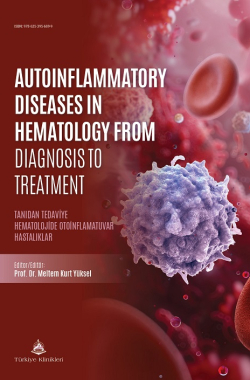ALLOGENEIC DONOR SELECTION
İlknur Nizam Özen
Antalya Training and Research Hospital, Department of Hematology, Antalya, Türkiye
Nizam Özen İ. Allogeneic Donor Selection. In: Kurt Yüksel M, editor. Autoinflammatory Diseases in Hematology from Diagnosis to Treatment. 1st ed. Ankara: Türkiye Klinikleri; 2025. p.235-239.
ABSTRACT
EPrimary immune regulatory disorders (PIRDs) are a distinctive group of diseases which are inborn errors of immunity. They present with lymphoproliferation, autoimmunity, autoinflammation, and malignancy and all of these are signs of dysregulation of the immune system. Infections are inevitable consequences of these manifestations. PIRDs consist of systemic autoinflammatory diseases (AIDs), autoimmune lymphoproliferative syndrome (ALPS), and common variable immunodeficiency (CVID). Most of the AIDs are monogenic diseases, and the mutations in genes are responsible for the inflammatory process. First comprehensive survey of HSCT in PIRDs patients was published at 2020 by Chan et al. The survey consisted of 226 patients with PIRDs who underwent allo-HSCT from 1982 to 2017. Of all patients, 76% had gene defects. Only four patients with a well defined AID were included. Two patients had adenosine deaminase 2 deficiency (DADA2), one patient presented with a mevalonate kinase (MVK) mutation and one patient had a PSTPIP1 mutation. Two patients could reach complete remission after HSCT. When conventional immunosuppressive therapeutic options fail to control the disease, HSCT in AIDs may have an important role to achieve sufficient control of the disease. HSCT is most effective when there is an hematopoetic involvement. Unfortunately, the experience about HSCT mostly rely on case reports for many AIDS. To reach consensus on the convenient choice of conditioning regimen, donors and sufficient level of donor chimerism, further studies should be performed.
Keywords: Deficiency of adenosine deaminase 2; GATA2 deficiency; Lymphohistiocytosis, hemophagocytic; Transplantation, homologous
Kaynak Göster
Referanslar
- Signa S, Dell'Orso G, Gattorno M, Faraci M. Hematopoietic stem cell transplantation in systemic autoinflammatory diseases the first one hundred transplanted patients, Expert Review of Clinical Immunology. 2022;18:7,667-689. [Crossref] [PubMed]
- Di Donato G, D'angelo DM, Breda L, et al. Monogenic autoinflammatory diseases: state of the art and future perspectives. Int J Mol Sci. 2021;22(12):6360. [Crossref] [PubMed] [PMC]
- Chan AY, Leiding JW, Liu X, et al. Hematopoietic cell transplantation in patients with primary immune regulatory disorders (PIRD): a primary immune deficiency treatment consortium (PIDTC) survey. Front Immunol. 2020;11:1-7. [Crossref] [PubMed] [PMC]
- Elkan PN, Pierce SB, Segel R, et al. Mutant adenosine deaminase 2 in a polyarteritis nodosa vasculopathy. N Engl J Med. 2014;370(10):921-931. [Crossref] [PubMed]
- Zhou Q, Yang D, Ombrello AK, et al. Early-onset stroke and vasculopathy associated with mutations in ADA2. N Engl J Med. 2014;370(10):911-920. [Crossref] [PubMed] [PMC]
- Tangye SG, Al-Herz W, Bousfiha A, et al. Human inborn errors of immunity: 2019 update on the classification from the international union of immunological societies expert committee. J Clin Immunol. 2020;40(1):24-64. [Crossref]
- Hashem H, Kumar AR, Müller I, Babor F, Bredius R, Dalal J et al. Deficiency of Adenosine Deaminase Type 2 Foundation. Hematopoietic stem cell transplantation rescues the hematological, immunological, and vascular phenotype in DADA2. Blood. 2017;130(24):2682-2688. [Crossref] [PubMed] [PMC]
- Klaus-Michael Debatin HSCT cures ADA2 deficiency Blood 2017130(24):2582-2583.
- Bucciol G, Delafontaine S, Segers H, Bossuyt X, Hershfield MS, Moens L et al. Hematopoietic Stem Cell Transplantation in ADA2 Deficiency: Early Restoration of ADA2 Enzyme Activity and Disease Relapse upon Drop of Donor Chimerism. J Clin Immunol. 2017;37(8):746-750. [Crossref] [PubMed]
- Grossman J, Cuellar-Rodriguez J, Gea-Banacloche J, Zerbe C, Calvo K, Hughes T et al. Nonmyeloablative allogeneic hematopoietic stem cell transplantation for GATA2 deficiency. Biol Blood Marrow Transplant. 2014;20(12):1940-8. [Crossref] [PubMed] [PMC]
- Vicente C, Vazquez I, Conchillo A, et al. Overexpression of GATA2 predicts an adverse prognosis for patients with acute myeloid leukemia and it is associated with distinct molecular abnormalities. Leukemia. 2012;26:550-554. [Crossref] [PubMed]
- Hahn CN, Chong CE, Carmichael CL, et al. Heritable GATA2 mutations associated with familial myelodysplastic syndrome and acute myeloid leukemia. Nat Genet. 2011;43:1012-1017. [Crossref] [PubMed] [PMC]
- West RR, Hsu AP, Holland SM, et al. Acquired ASXL1 mutations are common in patients with inherited GATA2 mutations and correlate with myeloid transformation. Haematologica. 2014;99:276-281. [Crossref] [PubMed] [PMC]
- Cuellar-Rodriguez J, Gea-Banacloche J, Freeman AF, Hsu AP, Zerbe CS, Calvo KR et al. Successful allogeneic hematopoietic stem cell transplantation for GATA2 deficiency. Blood. 2011;118(13):3715-20. [Crossref] [PubMed] [PMC]
- Tholouli E, Sturgess K, Dickinson RE, Gennery A, Cant AJ, Jackson G et al. In vivo T-depleted reduced-intensity transplantation for GATA2-related immune dysfunction. Blood. 2018;131(12):1383-1387. [Crossref] [PubMed] [PMC]
- Dennis Hickstein HSCT for GATA2 deficiency across the pond. Blood. 2018;131(12):1272-1274. [Crossref] [PubMed] [PMC]
- Henter J-I, Samuelsson-Horne AC, Aricò M, Egeler RM, Elinder G, Filipovich AH, et al.; for the Histiocyte Society, Treatment of hemophagocytic lymphohistiocytosis with HLH-94 immunochemotherapy and bone marrow transplantation. Blood 2002;100(7):2367-2373. [Crossref] [PubMed]
- Abinun M, Slatter MA. Haematopoietic stem cell transplantation in paediatric rheumatic disease. Curr Opin Rheumatol. 2021;33(5):387-397. [Crossref] [PubMed]

